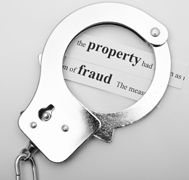 Real estate fraud is something every real estate professional wants to avoid; no one wants to get caught in the middle of a scam. Take the first step in avoiding fraud and educate yourself to spot the different types of fraud, and learn how to use the right technology to detect fraud before it’s too late.
Real estate fraud is something every real estate professional wants to avoid; no one wants to get caught in the middle of a scam. Take the first step in avoiding fraud and educate yourself to spot the different types of fraud, and learn how to use the right technology to detect fraud before it’s too late.
We’re going to look at one particular type of fraud in this post: appraisal or valuation fraud. We’ve talked about fraud many times before, and how to detect appraisal fraud. It’s one of the many reasons for leveraging automated valuation model (AVM) technology. With an AVM report, you can independently audit any suspicious property appraisals you come across to ensure all the information checks out.
Your client will appreciate your efforts to dig deeper because it demonstrates your dedication as a real estate sales professional who follows a high code of ethics and professional standards, such as doing due diligence to weed out fraud.
There are all kinds of unethical homebuyers and sellers who are out to commit real estate fraud and scam their way into a bigger mortgage or better selling price. Greed, desperation, or opportunity drive scammers who have been caught inflating salaries on mortgage applications, posing as a legitimate property owner, or even taking out numerous mortgages and then dashing with the cash while the real owner is left to clean up the mess.
Here are some basic fraud prevention tips:
- Know your client.
- Know your market – heated markets are hubs for fraud.
- Exercise due diligence in your research — property flips, sales/listing history, and exposure time can tell a story.
- Issue letters of engagement with every assignment but particularly with unfamiliar clients.
- Password-protect your reports and only give the password to your client.
- Decline if it doesn’t feel right – providing a reliance letter to a new intended user is not a mandatory requirement; you have the right to decline – it is an extension of risk.
Appraisal fraud is often an effort to artificially and deliberately raise property value with an above-market appraisal. Maybe the appraiser is in on the scam, but often they are also unwitting fraud victims. Their report can be doctored after they’ve completed it, without the appraiser knowing.
Founded in 1938, the Appraisal Institute of Canada grants the Accredited Appraiser Canadian Institute (AACI™) and Canadian Residential Appraiser (CRA™) designations. To prevent valuation fraud, they suggest:
- Looking for signs of altered data alteration such as: typed in data (value conclusions in the Direct Comparison Approach, Cost Approach or Income Approach, adjustments of comparable sales), blank fields or fields where information appears to have been “whited-out”;
- Thoroughly reading the appraisal report to understand the data, the analysis and the comparable properties relied upon to arrive at the final value;
- Engaging a professional appraiser to conduct an on-site inspection or drive-by of the property to validate information supplied as part of the mortgage application;
- Asking the professional appraiser for a reliance letter if you are not the original client or intended user of an appraisal report. Reliance letters are critical to the mortgage process. They are issued by the author of the report/appraiser and provide a great cross-reference tool to validate the value conclusion and data from the original report.
- Contacting the appraisal professional if you suspect any fraudulent activity.
Above is just a short list of behaviours that can occur that can mean fraud. Your ears might be ringing but here come the words again: due diligence saves the day, most of the time. Think of water, forcefully flowing from the tap as your deals, now think of the spatter that escapes the stream as representing these instances when something on a deal is off. Maybe in these cases it is better to dig a little deeper and perhaps pass on a deal rather than getting caught in the middle of a fraud scheme that can not only get you in trouble, but also put your relationships with your partners at risk.
Use GeoWarehouse to conduct this due diligence and stop real estate fraud and all the resulting consequences.
Visit www.geowarehouse.ca today.







